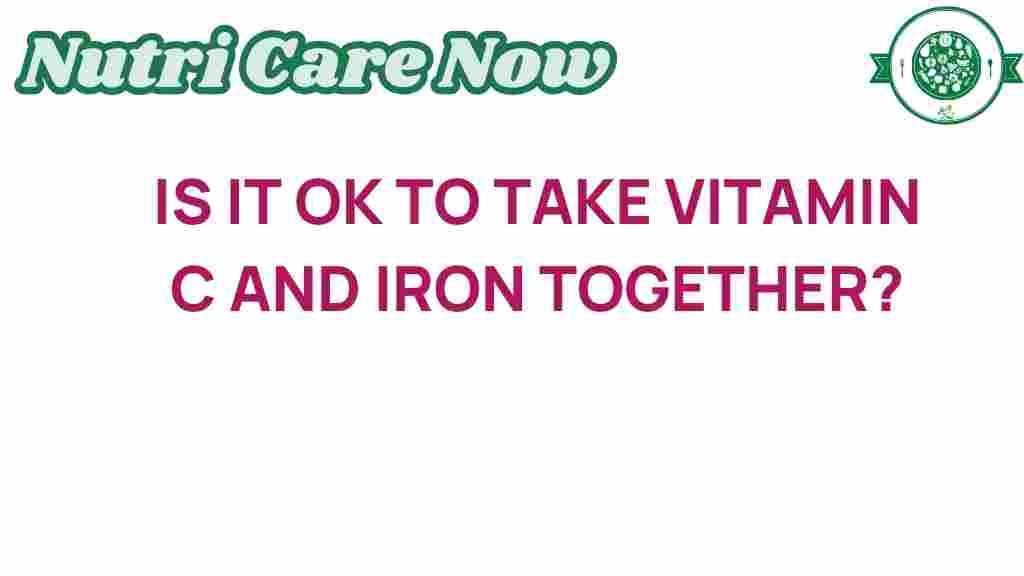The Surprising Truth: Can You Safely Combine Vitamin C and Iron?
When it comes to health and nutrition, the combination of vitamins and minerals can make a significant impact on our overall well-being. Among the various nutrient pairings, the combination of Vitamin C and Iron has generated considerable interest due to their roles in enhancing health and nutritional absorption. But can you safely combine these two supplements? In this article, we will explore the science behind Vitamin C and Iron, how they interact, and the best practices for incorporating them into your diet safely.
The Role of Vitamin C and Iron in Nutrition
Before we delve into the safety of combining Vitamin C and Iron, it is essential to understand their individual roles in our body.
What is Vitamin C?
Vitamin C, also known as ascorbic acid, is a water-soluble vitamin that is vital for numerous bodily functions, including:
- Supporting the immune system
- Promoting collagen production
- Acting as a powerful antioxidant
- Aiding in the absorption of Iron
What is Iron?
Iron is a crucial mineral that plays a significant role in transporting oxygen throughout the body. It is essential for:
- Producing hemoglobin in red blood cells
- Supporting energy metabolism
- Contributing to cognitive function
How Does Vitamin C Affect Iron Absorption?
The relationship between Vitamin C and Iron is particularly noteworthy when it comes to absorption. Studies have shown that Vitamin C enhances the absorption of non-heme iron, the type of iron found in plant-based foods. Here’s how it works:
- Reduction of Iron Oxidation: Vitamin C helps reduce ferric iron (Fe3+) to ferrous iron (Fe2+), which is more soluble and easier for the body to absorb.
- Increased Bioavailability: This increased solubility improves the bioavailability of Iron, meaning your body can utilize more of it from the food you eat.
Combining Vitamin C and Iron: Safety Considerations
While combining Vitamin C and Iron can enhance absorption, there are some safety considerations to keep in mind.
Dosage and Timing
When taking supplements, it’s crucial to consider the dosage of both Vitamin C and Iron. Here are some recommendations:
- Vitamin C: The recommended daily allowance (RDA) for adults is 65 to 90 mg, with a maximum of 2,000 mg.
- Iron: The RDA varies based on age and gender, but for most adult men, it is 8 mg, and for women, it is 18 mg (increases to 27 mg during pregnancy).
To maximize absorption, consider taking these supplements together during a meal. This can improve the uptake of both nutrients and reduce gastrointestinal discomfort.
Possible Interactions with Other Nutrients
While Vitamin C enhances Iron absorption, it may also interfere with the absorption of other minerals if taken in excess. For example:
- High doses of Vitamin C can inhibit the absorption of copper.
- Excessive Iron supplementation can lead to decreased Zinc absorption.
It’s essential to maintain a balanced diet to ensure adequate intake of all essential nutrients.
Step-by-Step Guide to Safely Incorporate Vitamin C and Iron
Here’s a step-by-step guide to safely combine Vitamin C and Iron in your diet:
Step 1: Assess Your Nutritional Needs
Before starting any new supplementation, evaluate your dietary habits and nutritional needs. Consider consulting with a healthcare professional or a registered dietitian.
Step 2: Choose the Right Sources
Incorporate natural sources of Vitamin C and Iron into your diet:
- Vitamin C Sources: Citrus fruits, strawberries, bell peppers, broccoli, and tomatoes.
- Iron Sources: Red meat, poultry, fish, lentils, beans, and fortified cereals.
Step 3: Consider Supplementation
If you find it challenging to get enough Vitamin C and Iron from your diet, consider supplements. Look for high-quality supplements that combine both nutrients.
Step 4: Monitor Your Intake
Keep track of the amounts of Vitamin C and Iron you consume. Aim to stay within the recommended daily allowances to prevent adverse effects.
Step 5: Stay Hydrated and Balanced
Drinking plenty of water and maintaining a balanced diet rich in various nutrients will enhance your overall health and aid in the absorption of vitamins and minerals.
Troubleshooting Tips for Supplementation
If you experience any side effects or have concerns about combining Vitamin C and Iron, consider these troubleshooting tips:
1. Monitor for Gastrointestinal Issues
Some individuals may experience stomach upset or nausea when taking Iron supplements. If this occurs, consider:
- Taking the supplement with food.
- Reducing the dosage and gradually increasing it.
2. Check for Allergies
Always check the ingredient list of your supplements for potential allergens or irritants.
3. Consult with a Healthcare Professional
If you have pre-existing health conditions or are taking other medications, consult a healthcare professional to ensure safety when combining Vitamin C and Iron.
Conclusion
Combining Vitamin C and Iron can indeed enhance the absorption of Iron and provide various health benefits. However, it’s essential to approach supplementation with caution, keeping in mind the recommended dosages and potential interactions with other nutrients. By following a balanced diet and considering your individual nutritional needs, you can safely enjoy the advantages of these essential nutrients. Remember, health is a journey, and informed choices lead to better outcomes.
For more information on nutrition and dietary supplements, you can visit this helpful resource. And for additional tips on maintaining a balanced diet, check out our nutrition guide.
This article is in the category Supplements and created by NutriCareNow Team
